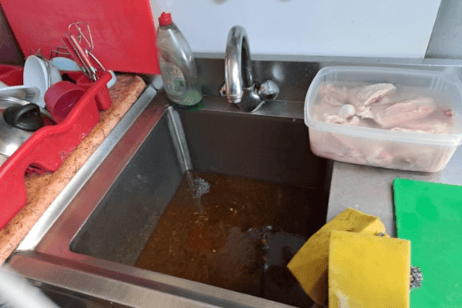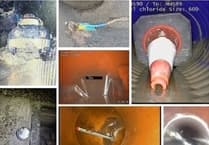SOUTH West Water has prevented more than one million litres of fats, oils and greases (FOG) from entering its sewer network this October.
This is thanks to its ongoing partnership with Environmental Compliance and Services (ECAS).
FOG, along with unflushable items such as wet wipes and sanitary products, are one of the leading causes of sewer blockages across the South West.
When allowed to escape down sinks or drains, it hardens and mixes with unflushables, causing blockages that can lead to flooding, pollution, and costly repairs to the sewage system.
That’s why South West Water is encouraging customers to ‘Bin It, Don’t Block It’ this Unblocktober and take small, everyday actions to keep drains flowing freely and protect the environment.
Since the two organisations joined forces, ECAS has worked with more than 2,000 food service establishments on behalf of South West Water, helping them to manage and dispose of FOG responsibly.
Over 575 grease traps have been installed at a variety of food service establishments to reduce blockages, and ECAS has worked with businesses to ensure they are equipped to prevent FOG from entering the sewer network.
The ECAS team works on behalf of South West Water, both reactively by investigating sites linked to sewer blockages and proactively by visiting businesses in known hotspot areas identified by South West Water, where blockages are more likely to occur.
Through site visits, practical demonstrations, and ongoing compliance support, ECAS helps businesses understand the impact of poor grease management and provides them with practical steps to prevent it.
Marc Downes, Operational Performance Manager at ECAS, said: ‘If we’re responding to a blockage, we’ll show the food business owner what’s happened in the sewer network, and how it relates to their kitchen operations.
‘Most food service establishments will do what they can to avoid a blockage once they know how it can happen.
‘The time we spend with kitchen teams involves reviewing their daily kitchen practices, assessing if they have the right grease management systems in place, and ensuring staff understand what happens if they allow FOG to escape and get into the sewers.
‘To put it in perspective, one million litres of FOG could fill about 22,000 large kitchen sinks, so preventing this much from entering the sewer network really highlights the positive changes these food businesses have made’.



Comments
This article has no comments yet. Be the first to leave a comment.